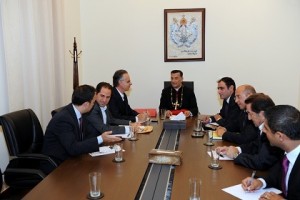 The Christian four-party panel on the electoral law on Sunday agreed to endorse the electoral law proposed by the so-called Orthodox Gathering, under which each sect would elect its own lawmakers, LBCI reported on sunday .
The Christian four-party panel on the electoral law on Sunday agreed to endorse the electoral law proposed by the so-called Orthodox Gathering, under which each sect would elect its own lawmakers, LBCI reported on sunday .
The panel took its decision during a meeting held in Bkirki. The four-party panel comprises representatives from the Free Patriotic Movement, the Lebanese Forces, the Phalange Party and the Marada Movement.
The electoral parliamentary subcommittee charged with finalizing the electoral law for the 2013 elections is scheduled to convene on Tuesday after the March 14 opposition agreed to Speaker Nabih Berri’s proposal of residing in a hotel near the parliament building in downtown Beirut, as a safety precaution.
The opposition alliance had announced following the assassination of Internal Security Forces Intelligence Bureau head Brigadier General Wissam al-Hassan on October 19 that they will be boycotting the national dialogue sessions and the government’s work, awaiting Prime Minister Najib Miqati’s resignation.
Lebanon’s Cabinet approved last August a new electoral draft law that called for proportional representation and divided the country into 13 districts as follows: Beirut 2, south Lebanon 2, Bekaa 3, north Lebanon 3 , Mount Lebanon 3.
The new electoral law was approved by the majority of ministers, including the FPM ministers . However the ministers that representProgressive Socialist Party leader MP Walid Jumblatt’s bloc voted against it.
Even though the FPM ministers voted for the cabinet ‘s electoral law draft, FPM MPs Alain Aoun and Neemtallah Abi Nasr submitted another draft electoral law to the parliament . This is the so called “Greek Orthodox gathering proposal” which calls on each sect in Lebanon to vote only for its candidate in the elections based on one electoral district for the whole country .
March 14 Christian MPs Georges Adwan, Boutros Harb and Sami Gemayel submitted a draft electoral law based on 50 districts and winner take all majority to the Parliament’s General Secretariat last October
Jumblatt and his PSP MPs favor the current 1960 winner take all electoral law.
Lebanon is set to hold new parliamentary elections around June 2013, but the country’s political circles are divided over the electoral law issue .
Chairman of the Administration and Justice Committee of the Lebanese Parliament MP Robert Ghanem told Al Nahar newspaper in a report published November 11 that it is impossible for the parliament to reach an agreement on a new electoral law for the 2013 elections in light of the divisions and the ambiance of assassinations in Lebanon.
He said the best solution will be to adopt the 1960 electoral law with some modifications and work on an electoral law for the 2017 elections.
But Hezbollah which currently dominates the cabinet as well as the maronite Patriarch reject the 1960 electoral law.
Lebanese fo

Leave a Reply
You must be logged in to post a comment.